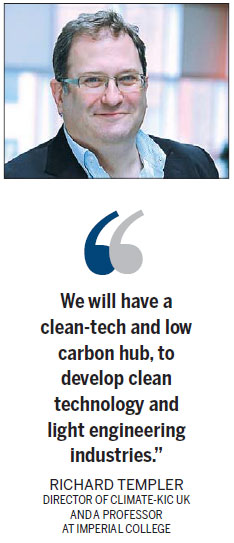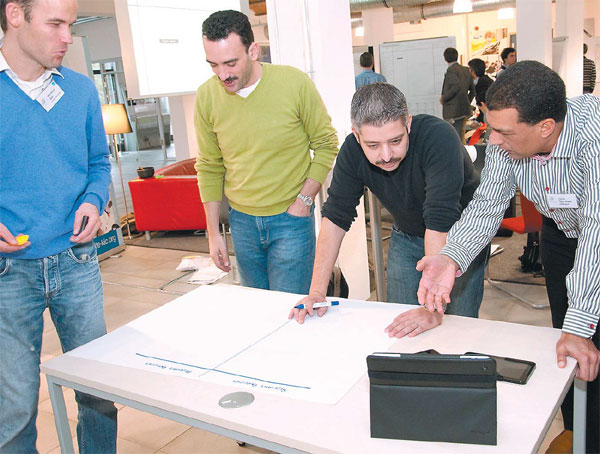Creating climate change solutions through entrepreneurship
Updated: 2015-04-10 07:17
By Cecily Liu(China Daily Europe)
|
|||||||||||
Lingang New City could be test of development model
Europe is bringing entrepreneurship to bear on innovative climate change solutions. The effort is led by the work of Climate-KIC, the European Union's main climate innovation initiative and Europe's largest public-private partnership.
KIC stands for knowledge and innovation communities.
|
Program participants work on business plan at Climate-KIC masterclass. Photos provided to China Daily |
"In Europe many young people have become risk averse, happy to work under a big corporate structure. Climate-KIC was set up to change this attitude, encouraging young people to create new climate change solutions through entrepreneurship," says Richard Templer, director of Climate-KIC UK and a professor at Imperial College.
"The economic reward is huge -the Confederation of British Industry estimates the size of the global green market is 3.3 trillion pounds ($4.92 trillion; 4.48 trillion euros)."
Lingang New City, a planned city located in the Pudong New Area of Shanghai, may soon become a testing ground for this innovative entrepreneurship development model. This is the result of knowledge exchanges between the Climate-KIC team in the UK and the local government in China.
In January, Templer visited Lingang as part of a delegation from London's Sustainable Development Commission. He saw great potential to bring this entrepreneurship model to Lingang.
The city's construction began in 2003 and is scheduled to finish in 2020. The city is expected to become a cluster of green technology firms, where new technology to reduce pollution and drive environmental conservation will be created.
One major area of potential knowledge exchange is the experience of creating an entire new area devoted to climate change answers. London is also building one such area, known as Old Oak and Park Royal, in West London.
The Mayor of London Boris Johnson recently outlined proposals to transform Old Oak and Park Royal into a thriving new district with up to 24,000 new homes and more than 55,000 jobs.
"We will have a clean-tech and low carbon hub, to develop clean technology and light engineering industries, so in this sense we will have a lot of knowledge exchange with Lingang," Templer says.
At Imperial College, Templer leads a Climate-KIC-run course on climate innovation, which combines business studies with environmental science and engineering, and an annual two-week summer school that takes students around Europe to develop business plans, and pitch to an expert panel.

Templer says that many students have developed leading climate innovation business ideas from the course, which have attracted funding from venture capitals. They have become entrepreneurs after completing the course, working in the low carbon and innovation fields.
Templer says there are already many Chinese students in the course. Last year, Templer was also part of a climate change related summer school course at Imperial College attended by 50 Chinese secondary school students 17 and 18 years old. "I told them about the science of climate change, which they found very interesting," he says.
Another initiative from Climate-KIC is an accelerator program for clean-tech start-ups and an annual entrepreneurship competition called the Venture Competition.
Already 53 selected companies are working in this clean-tech program and only seven of them have failed, which is a very low rate. Twenty-five start-ups have emerged from the program and raised an average of $2 million from the public - and 88 percent of the start-ups that have left the process have won more than 1 million pounds of seed funding. Such a high success rate is attributed to the extensive help given to the teams by Templer and others in Climate-KIC.
"We train them on how to produce business plans and other elements such as sales, marketing and customer discovery," he says.
Through its network, Climate-KIC helps entrepreneurs identify potential partnerships with larger businesses. For example, some startups have become key suppliers to larger businesses, providing them with niche sector technology that will make a big difference to the overall production chain.
"We hope to replicate this course in Lingang, working with local universities. Imperial College already has a strategic partnership with Tsinghua University so we can build on this cooperation to develop the course," he says.
Templer says the course is unusual because students do not attend lectures. Instead they are encouraged to interact with the real business environment and be creative in their thinking. Templer describes this approach as "learning by doing".
Alongside classroom learning, students visit businesses in various sectors including low carbon, food manufacturing and financial services. They visit businesses in different cities to learn about business practices in different environments. Templer says Chinese cities, like Shanghai, also might be incorporated into the course.
"For example, they could meet Chinese solar power companies and find out how the Chinese economy is driven by solar industry growth, which gives them an insight into the clean-tech industry of China."
After the students gain exposure to industry, they form teams to create a viable business plan and pitch it to venture capital firms, creating their own climate solution companies around the fifth week of the course.
Templer says that China's major concern at the moment is air pollution, created in part by low-grade coal being burnt, and that the country's leadership faces great challenges if reliance on coal cannot be effectively reduced.
He says a similar situation was experienced by the UK in the early 1960s, which led to the creation of new legislation that required coal to be of a higher quality. As a result, gas became a cheaper source of energy, and it typically produced half the amount of carbon dioxide as coal. Production of energy also moved away further from the cities.
Templer says that the government of Lingang has asked his team to help with making a plan for energy provision, and the use of cleaner energy, and he believes these are areas the UK's expertise can help with.
"The solar industry can be a potential source of energy provision. As the city is next to the sea, tidal energy can also be used, and this is an area the UK is developing, with examples of projects like the potential tidal reservoir at Swansea Bay," he says.
Templer says that the planned clusters of clean technology industry in Lingang are very helpful, because they can help businesses to become inspired by each others' models and set up cost-cutting collaboration.
"It is great to see industries, startups and the government in Lingang working together to create this concentration effect. Synergy can be created especially between manufacturing companies, commonly known as symbiosis in the circular economy," he says.
One example is the waste heat from fuel production from one manufacturer being used by another to produce a useful product, which in turn lowers the overall carbon footprint of the economy, he says.
Templer says because this idea of a circular economy will also be implemented in the Old Oak and Park Royal area, China and the UK have great potential for knowledge exchange and cooperation.
Templer says he is very excited about the opportunity to work with the Chinese government on developing a similar climate change entrepreneurship course and accelerator program, because he believes Chinese students have great entrepreneurial spirit.
He is also looking forward to working with Chinese academic institutions to create an environment that can support Chinese start-ups, because an academic setting is very important when creating an accelerator program.
"Universities can provide knowledge, expertise and great talent, all of which support the growth of start-ups especially in their early stages of growth," he says.
cecily.liu@chinadaily.com.cn
(China Daily European Weekly 04/10/2015 page19)
Today's Top News
Spotlight set to shine on royal sibling
Stronger yuan boosts tourism
Exhibition recalls zoo wardens who hid dozens of Jews
Germanwings flight canceled after bomb threat
Failed developer shoots dead 3, injuries 2 in Milan
Creating climate change solutions through entrepreneurship
Tremendous opportunities created for Dutch businesses in China
Belgium's mixed signals to China
Hot Topics
Lunar probe , China growth forecasts, Emission rules get tougher, China seen through 'colored lens', International board,
Editor's Picks

|

|

|

|

|

|







